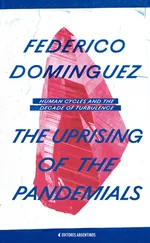SECTION XXIV.
But does some one say that souls are evil? If it be that they meet with evil things providentially, and with a view to their preservation, this is not an evil, but a good, and from the Good, Who makes even the evil good. But, if we say that souls become evil, in what respect do they become evil, except in the failure of their good habits and energies; and, by reason of their own lack of strength, missing their aim and tripping? For we also say, that the air around us becomes dark by failure and absence of light, and yet the light itself is always light, that which enlightens even the darkness. The Evil, then, is neither in demons nor in us, as an existent evil, but as a failure and dearth of the perfection of our own proper goods.
SECTION XXV.
But neither is the Evil in irrational creatures, for if you should take away anger and lust, and the other things which we speak of, and which are not absolutely evil in their own nature, the lion having lost his boldness and fierceness will not be a lion; and the dog, when he has become gentle to every body, will not be a dog, since to keep guard is a dog’s duty, and to admit those of the household, but to drive away the stranger. So the fact that nature is not destroyed is not an evil, but a destruction of nature, weakness, and failure of the natural habitudes and energies and powers. And, if all things through generation in time have their perfection, the imperfect is not altogether contrary to universal nature.
SECTION XXVI.
But neither is the Evil in nature throughout, for if all the methods of nature are from universal nature, there is nothing contrary to it. But in each individual (nature) one thing will be according to nature, and another not according to nature. For one thing is contrary to nature in one, and another in another, and that which is according to nature to one, is to the other, contrary to nature. But malady of nature, that which is the contrary to nature, is the deprivation of things of nature. So that there is not an evil nature; but this is evil to nature, the inability to accomplish the things of one’s proper nature.
SECTION XXVII.
But, neither is the Evil in bodies. For deformity and disease are a defect of form, and a deprivation of order. And this is not altogether an evil, but a less good; for if a dissolution of beauty and form and order become complete, the body itself will be gone. But that the body is not cause of baseness to the soul is evident, from the fact that baseness continues to coexist even without a body, as in demons. For this is evil to minds and souls and bodies, (viz.) the weakness and declension from the habitude of their own proper goods.
SECTION XXVIII.
But neither (a thing which they say over and over again) is the evil in matter, so far as it is matter. For even it participates in ornament and beauty and form. But if matter, being without these, by itself is without quality and without form, how does matter produce anything—matter, which, by itself, is impassive? Besides how is matter an evil? for, if it does not exist in any way whatever, it is neither good nor evil but if it is any how existing, and all things existing are from the Good, even it would be from the Good; and either the Good is productive of the Evil, or the Evil, as being from the Good, is good; or the Evil is capable of producing the Good; or even the Good, as from the Evil, is evil; or further, there are two first principles, and these suspended from another one head. And, if they say that matter is necessary, for a completion of the whole Cosmos, how is matter an evil? For the Evil is one thing, and the necessary 41is another. But, how does He, Who is Good, bring anything to birth from the Evil? or, how is that, which needs the Good, evil? For the Evil shuns the nature of the Good. And how does matter, being evil, generate and nourish nature? For the Evil, quâ evil, neither generates, nor nourishes, nor solely produces, nor preserves anything.
But, if they should say, that it does not make baseness in souls, but that they are dragged to it, how will this be true? for many of them look towards the good; and yet how did this take place, when matter was dragging them entirely to the Evil? So that the Evil in souls is not from matter, but from a disordered and discordant movement. But, if they say this further, that they invariably follow matter, and unstable matter is necessary for those who are unable to stand firmly by themselves, how is the Evil necessary, or the necessary an evil?
SECTION XXIX.
But neither is it this which we affirm—the “privation fights against the Good by its own power 42”; for the complete privation is altogether powerless, and the partial has the power, not in respect of privation, but in so far as it is not a complete privation. For, whilst privation of good is partial, it is not, as yet, an evil, and when, it has become an accomplished fact, the nature of the evil has departed also.
SECTION XXX.
But, to speak briefly, the Good is from the one and the whole Cause, but the Evil is from many and partial defects. Almighty God knows the Evil qua good; and, with Him, the causes of the evils are powers producing good 43. But, if the Evil is eternal, and creates, and has power, and is, and does, whence do these come to it? Is it either from the Good, or by the Good from the Evil, or by both from another cause? Everything that is according to nature comes into being from a defined cause. And if the Evil is without cause, and undefined, it is not according to nature. For there is not in nature what is contrary to nature; nor is there any raison d’ etre for want of art in art. Is then the soul cause of things evil, as fire of burning, and does it fill everything that it happens to touch with baseness? Or, is the nature of the soul then good, but, by its energies, exists sometimes in one condition, and sometimes in another? If indeed by nature, even its existence is an evil, and whence then does it derive its existence? Or, is it from the good Cause creative of the whole universe? But, if from this, how is it essentially evil? For good are all things born of this. But if by energies, neither is this invariable, and if not, whence are the virtues? Since it (the soul) comes into being without even seeming good. It remains then that the Evil is a weakness and a falling short of the Good.
SECTION XXXI.
The Cause of things good is One. If the Evil is contrary to the Good, the many causes of the Evil, certainly those productive of things evil, are not principles and powers, but want of power, and want of strength, and a mixing of things dissimilar without proportion. Neither are things evil unmoved, and always in the same condition, but endless and undefined, and borne along in different things, and those endless. The Good will be beginning and end of all, even things evil, for, for the sake of the Good, are all things, both those that are good, and those that are contrary. For we do even these as desiring the Good (for no one does what he does with a view to the Evil), wherefore the Evil has not a subsistence, but a parasitical subsistence, coming into being for the sake of the Good, and not of itself.
SECTION XXXII.
It is to be laid down that being belongs to the Evil as an accident and by reason of something else, and not from its own origin, and thus that that which comes into being appears to be right, because it comes into being for the sake of the Good, but that in reality it is not right for the reason that we think that which is not good to be good. The desired is shewn to be one thing, and that which comes to pass is another. The Evil, then, is beside the path, and beside the mark, and beside nature, and beside cause, and beside beginning, and beside end, and beside limit, and beside intention, and beside purpose. The Evil then is privation and failure, and want of strength, and want of proportion, and want of attainment, and want of purpose; and without beauty, and without life, and without mind, and without reason, and without completeness, and without stability, and without cause, and without limit, and without production; and inactive, and without result, and disordered, and dissimilar, and limitless, and dark, and unessential, and being itself nothing in any manner of way whatever. How, in short, can evil do anything by its mixture with the Good? For that which is altogether without participation in the Good, neither is anything, nor is capable of anything. For, if the Good is both an actual thing and an object of desire, and powerful and effective, how will the contrary to the Good,—that which has been deprived of essence, and intention, and power, and energy,—be capable of anything? Not all things are evil to all, nor the same things evil in every respect. To a demon, evil is to be contrary to the good-like mind—to a soul, to be contrary to reason—to a body, to be contrary to nature.
Читать дальше












